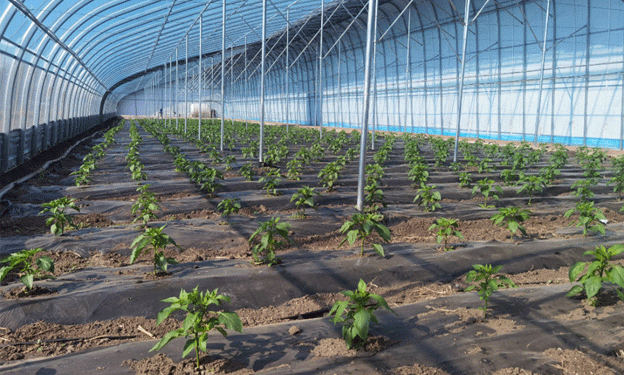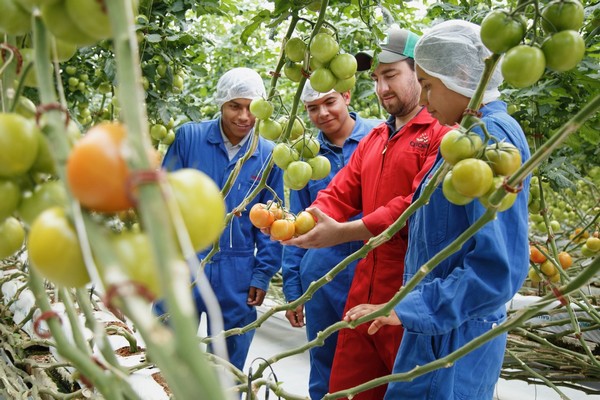In LinKou, while the chill of autumn brings with it bare trees and windy fields, the inside of the LinKou Forestry Company’s greenhouses tells a completely different story. Rows of fresh, tender vegetable seedlings are thriving, meticulously cared for by workers, showcasing the immense potential of controlled-environment agriculture. The lush greenery, set against the backdrop of high-tech farming, offers a glimpse into how modern greenhouse farming is bringing economic growth and ecological sustainability to the region.
To push forward its green economy initiative and align with the national goals of sustainable development, LinKou Forestry Company expanded its greenhouse project in 2023. Building on the four solar greenhouses it completed last year, which covered 3,900 square meters, the company has added another four greenhouses, bringing the total area to 6,780 square meters. This expansion is part of a broader strategy to extend LinKou’s agricultural value chain and create new avenues for local economic development.
Technology Empowering Agriculture
Greenhouse farming in LinKou goes beyond traditional methods. By integrating modern technology with precision agriculture, the company has made its greenhouses a model of efficiency and sustainability. As greenhouse technician Liu Cun explains, the solar greenhouses provide optimal light exposure, with an average controlled temperature of 25°C—ideal for vegetable growth. These favorable growing conditions are why crops like cucumbers, eggplants, and peppers are flourishing, providing fresh, organic produce to the community.
The smart greenhouses use cutting-edge technologies such as big data and automation. Key factors like temperature, light, water, and nutrients are closely monitored and controlled through automated systems. With just a press of a button, workers can manage various functions, including water pumps, shading systems, and fans, ensuring the optimal growing environment for crops. This high level of automation reduces labor costs and increases production efficiency, a key factor in ensuring the greenhouses’ profitability and long-term success.
Organic and Sustainable Practices
What sets LinKou’s greenhouses apart is the commitment to organic farming and sustainable methods. The entire process, from seeding to harvest, adheres to organic farming standards. Temperature and humidity inside the greenhouses are carefully regulated, allowing workers to monitor seedling growth and make timely adjustments, such as transplanting and thinning. This scientific approach to seedling management not only improves germination rates but also mitigates the risks associated with transporting seedlings over long distances. As a result, the quality of the produce is maintained, contributing to higher market value and consumer satisfaction.
As Chen Guangxu, one of the greenhouse administrators, explains, “By centralizing seedling cultivation and applying precision agriculture, we can significantly reduce risks and ensure the quality of our products.” This approach aligns with broader global trends in sustainable agriculture, where reducing inputs and improving yields through data-driven farming methods are becoming the new standard.
Local Economic Impact and Job Creation
Beyond improving agricultural yields, LinKou’s greenhouse project is creating much-needed employment for the local population. The company follows a “chain extension, chain strengthening” strategy, which is designed to both improve the efficiency of agricultural production and create jobs for the community. The model focuses on local job creation, promoting near-site employment for residents, and increasing household incomes. By providing stable jobs in greenhouse farming, the company not only strengthens its own business but also contributes to the overall economic resilience of the region.
The company’s commitment to extending and reinforcing the agricultural value chain is proving to be an effective way to stimulate local growth. The production of high-quality organic vegetables from these greenhouses is not only meeting local demand but also providing opportunities for export to larger markets, further fueling LinKou’s economic growth.
LinKou’s use of smart greenhouses and sustainable farming practices is a prime example of how technology can transform agriculture. By combining innovation with organic farming, LinKou Forestry Company has not only enhanced the productivity of its greenhouses but also boosted local employment and economic growth. As the company continues to expand its greenhouse project, it is setting a strong example for other regions to follow, highlighting the potential of smart, sustainable agriculture in the future of global food production.










